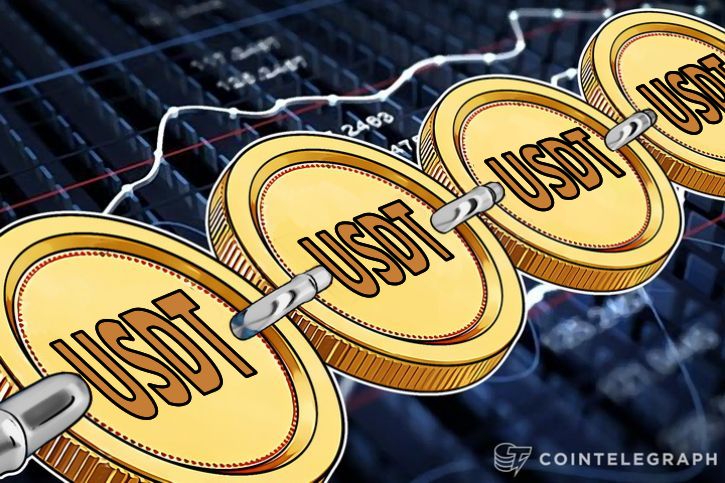Cointelegraph previously reported the controversy surrounding the digital currency called Tether. To recap, tether tokens are a digital currency that’s supposedly pegged 1:1 with U.S. dollars held in the Tether company’s bank account. The tether tokens can be used and traded, and at any time can be redeemed for one dollar from Tether’s bank account.
Tether and Bitfinex are sister companies with overlapping ownership, and both companies have come under scrutiny as their access to banking has been significantly curtailed. This began earlier in 2017, when one of their correspondent banks, Wells Fargo, began refusing their incoming and outgoing wire transfers.
Is it really money?
The controversy over Tether stems in large part from the “legal” section on their website. In that document, Tether asserts:
“Once you have Tethers, you can trade them, keep them, or use them to pay persons that will accept your Tethers. However, Tethers are not money and are not monetary instruments. They are also not stored value or currency. There is no contractual right or other right or legal claim against us to redeem or exchange your Tethers for money. We do not guarantee any right of redemption or exchange of Tethers by us for money. There is no guarantee against losses when you buy, trade, sell, or redeem Tethers.”
Here you have the company that creates a form of digital money claiming that it is not, in fact, money. The Tether company apparently will not “guarantee” any right of redemption of tether tokens. This makes it appear as though the company is not standing behind its tokens.
But wait, there’s more
Tether also assures users that it is routinely audited to ensure that it has sufficient reserves to fully back all tether tokens with U.S. dollars. However, up until now, the company had not provided any audit reports. They have promised additional audits, but at present, the last audit they refer to was published in March. Since then, the number of tether tokens in circulation has increased by several hundred million.
Any time somebody on Reddit questions whether the company will actually be going through with its audit, one of Bitfinex’s employees, bfx_drew, responds by offering to make a wager with the questioner. It’s a strange form of customer service to essentially ask: “Yeah, you wanna bet?”
Many on Reddit have also questioned how a company with limited banking ties could be receiving hundreds of millions of dollars in deposits. Without such deposits, the corresponding tether tokens that had been introduced to the market would not be fully backed by U.S. dollars. This would mean that Tether was running a fractional reserve.
Tether responds
Today the company responded to these questions. In an official statement released today, Tether pointed out:
“We are aware of online discussions about Tether’s lack of publicly-available audits. Periodic audits of our bank balances have been performed by the Taiwan-based auditing firm TOPSUN CPAs & Co. The results of those audits were for the benefit of shareholders and were not in a form suitable for public consumption (to begin with, they were in Mandarin). Nonetheless, we have asked them to prepare the following attestations (PDFs linked) in English, for release to the community, covering December 31, 2016; January 31,2017; February 28, 2017; and, March 31, 2017. As we are no longer banking in Taiwan, and given that we are achieving substantial scale, we have engaged Friedman, LLP, in New York, to perform comprehensive balance sheet audits on a quarterly basis going back to Dec 31, 2016. We will share those results with you as they become available in the coming weeks or months.”
With respect to their own claim that tether tokens are not money and are not guaranteed to be redeemed by the company, Tether writes:
“Our Terms of Service have been carefully picked apart by various malcontents and twisted to suggest that Tethers would not be redeemable for currency on some bizarre, malicious whim by Tether. That is untrue. While we reserve the right not to redeem for any particular customer, as we must, we will not do so for no reason. We have a duty to try to ensure that our service is not being used by persons from sanctioned countries, that is otherwise on a sanctions list, or that has some background check problem. In short, redemptions will not be unreasonably denied, but we reserve the right to selectively deny redemption and creation of Tethers on a case-by-case basis.”
Finally, Tether notes that it has enough intact banking relationships to service some, but not all, large customers:
“While our banking challenges are troublesome and distracting, tens of millions of dollars are able to flow in and out of Tether daily using the channels we have established. Although not available to all users, these flows have been sufficient to bring markets supporting Tether-based trading pairs back into alignment with markets supporting USD-based trading pairs.”
Malcontents? Really?
Tether’s Terms of Service (ToS) can certainly be interpreted in the way the company says they intend. Then again, it can be read in other ways, too. That’s the problem with an open-ended legal document. Their ToS simply says that the company can refuse to redeem tether tokens; it does not explicitly state the circumstances in which the company would do so.
In the end, it’s up to the buyers and sellers of tether tokens to decide whether those who question the company’s good intentions are malcontents or prophets.
